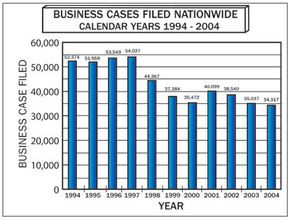Chapter 11 - Business Bankruptcy
Companies choose to file Chapter 11 because its long-term revenues will be higher than the liquidation value of the assets. This way, creditors can get more money back if they allow the debtor business to reorganize and work out a payment plan. The business becomes a debtor in possession, maintaining control and ownership of their assets and continuing their regular operations. At this point, there is usually no trustee.
A company that declares Chapter 11 must disclose all of its assets and make a list of all the debts that it is seeking protection from. This is the creditors' right to question the debtor, a fundamental part of bankruptcy law. In cases involving millions or billions of dollars, this step alone can be incredibly complex. The creditors also meet with the debtor.
Advertisement
If the bankruptcy court finds that there has been fraud or gross mismanagement on the part of the debtor, they can appoint a trustee, who will take over the operations of the debtor for the duration of the proceeding. The business continues to operate as normal, but the original owner is no longer in control. The trustee appointed to a specific bankruptcy may be different from the "U.S. Trustee." While federal bankruptcy courts are in charge of the proceedings, the Department of Justice also assigns a U.S. Trustee to each district. The U.S. Trustee serves as a watchdog over bankruptcy cases and may act as the trustee in a proceeding.
While under Chapter 11, a company can only make the usual sales and purchases that are part of its standard business operations. For example, it can't buy out another company, sell off a division of the company, or sell a major piece of equipment or property without approval from the court. It can't undergo a major expansion, either.
In all Chapter 11 proceedings, a creditors' committee represents the majority of the unsecured creditors, and negotiates the best possible payment options for them. Large-scale cases may have multiple creditors' committees, each representing different groups and factions of the creditors. Stockholders can also form a committee.
At this point, the debtor formulates a plan to reorganize its debts. This plan can be a simple as a payment plan. With larger bankruptcies, companies may take many steps to reorganize their debt. They might offer stock to some creditors. A retail business might have to close stores, lay off employees, or renegotiate union contracts. One of the major provisions of Chapter 11 allows a company to void many of its contracts, including union contracts, contracts with suppliers, and real estate leases.
The debtor can also "avoid" certain payments or purchases that happened in the period prior to the bankruptcy. The usual period is 90 days, but payments or gifts made to friends, family or company insiders have a one-year limit (or longer, depending on the state where the bankruptcy is filed). Some payments can be returned to the debtor and become subject to the terms of the reorganization plan. This keeps debtors from manipulating their assets and giving preference to certain creditors.
Once the debtor submits a reorganization plan, the creditors and the company's stockholders vote on it. Stockholders are generally very low in terms of priority, and even if they vote down the plan, the court can go ahead with it if the creditors approve. Once the court approves the plan, the Chapter 11 bankruptcy is certified and confirmed. Now the debtor must comply with the plan and make the proper payments to the creditors (or to the trustee, if one has been appointed).
It is important to note that during the period of reorganization, the company's stocks will be virtually worthless. If the company gets out of Chapter 11 and begins operating normally, those stocks can increase in value, but at first they will probably be worth much less than the initial purchase price. Bondholders can sometimes get a fraction of the bonds' face value as part of the reorganization.
If a debtor violates the terms of the plan, there are several potential consequences. A trustee may be appointed. If it appears that the company will not be able to operate profitably and follow through with repayment plans, the Chapter 11 will be converted into Chapter 7. This is a death sentence for the company.
No one ever goes to jail for being in debt. This is easy to overlook when many high profile corporate bankruptcies follow financial crimes committed by executives or accountants. Financial fraud can lead a company to bankruptcy, and the executives may be prosecuted, but bankruptcy itself is not a crime.
